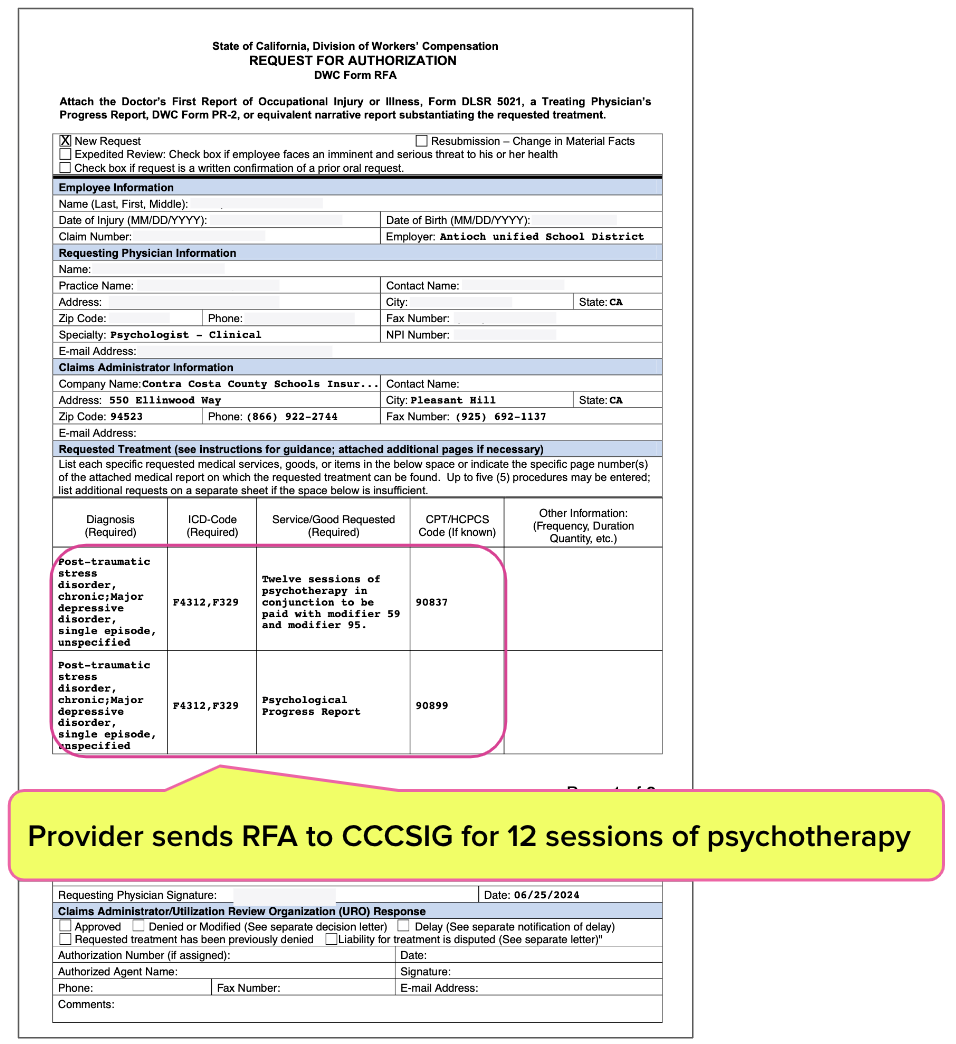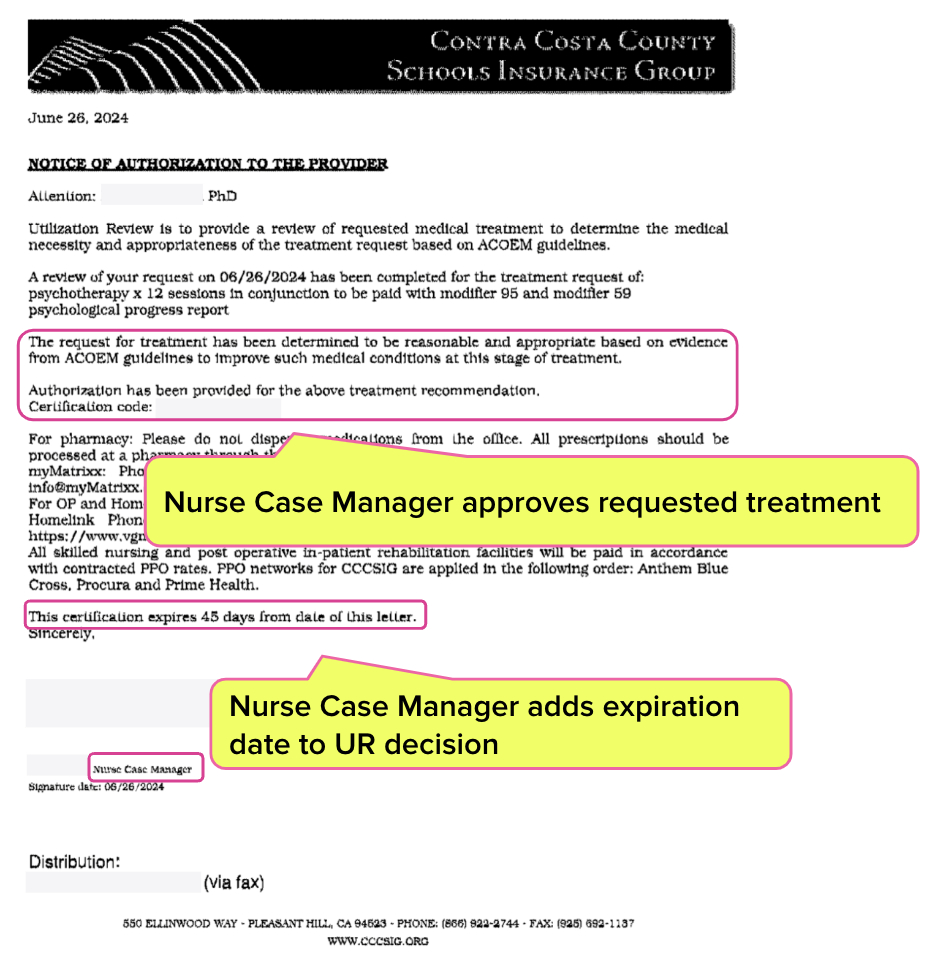CCCSIG Adds Bogus "Expiration Date" to UR Approval

Let’s be absolutely clear: in California workers’ comp, treatment authorization does not expire. Once Utilization Review (UR) determines that treatment is authorized, there is no legal or regulatory deadline by which the provider must furnish it.
More importantly, only a physician can modify a treatment requested by a California provider.
Despite these basic facts, a nurse case manager at Contra Costa County Schools Insurance Group (CCCSIG) issued a UR decision effectively modifying a request for 12 sessions of psychological treatment for an Antioch Unified School District employee—by stipulating that the authorization “expires” in 45 days.
The provider requested 12 sessions. But by adding a 45-day expiration date for a service that is typically provided weekly, the nurse case manager approved only six weeks of treatment
The care an injured worker requires is not some perishable grocery item. This tampering with a UR decision by a nurse case manager serves no purpose other than to create a pointless, potentially harmful bureaucratic obstacle for an injured worker trying to obtain the treatment deemed necessary by both the provider and the payer.
CCCSIG and its staff cannot impose arbitrary deadlines on treatment. No provider is under any obligation to honor UR “expiration dates,” which are wholly unsupported by any California UR law or regulation.
Unfortunately, claims administrators like CCCSIG are enabled and emboldened to make up their own rules by the do-nothing regulatory approach of California’s Division of Workers’ Compensation (DWC).
Provider Requests Psych Treatment
In California, a provider cannot furnish care to an injured worker without first submitting a Request for Authorization (RFA) to the claims administrator and obtaining authorization. UR is the process by which claims administrators approve or deny the treatments requested on RFAs.
In this case, the provider determined that psychotherapy was necessary to address post-traumatic stress and depression resulting from a work-related injury. In the RFA below, the provider requested a series of 12 psychotherapy sessions.
CCCSIG Approves Treatment—With a Twist
In California, treating doctors must submit RFAs according to strict format requirements, including mandatory use of DWC Form RFA (as shown above). However, claims administrators may respond to RFAs in any form or format they choose.
Because of this regulatory double standard, treatment approvals are often vague, insufficiently detailed, or in this case, inappropriately modified.
In the letter below, a CCCSIG nurse case manager acknowledged that CCCSIG’s UR department deemed the requested psychotherapy sessions “reasonable and appropriate” based on the relevant medical guidelines. But the case manager also took it upon themselves to add an arbitrary, unacceptable addendum:
“This certification expires 45 days from the date of this letter.”
CA Authorization: No “Expiration Dates” Allowed
UR has one purpose: to confirm the appropriateness and medical necessity of the requested treatment. No regulations allow claims administrators or UROs to impose a deadline on delivery.
Regarding an approved RFA, California Labor Code Section 4610 states only that “Communications regarding decisions to approve requests by physicians shall specify the specific medical treatment service approved.” The only deadlines mentioned are those by which the claims administrator must respond to the RFA.
California Code of Regulations (CCR) Section 9792.9.1 treats approval similarly, stating:
“All decisions to approve a request for authorization shall specify the specific the [sic] date the complete request for authorization was received [,] medical treatment service requested, the specific medical treatment service approved, and the date of the decision.”
There is absolutely no support in state law or regulations for “expiration dates” on UR approvals. Yet claims administrators and their UROs still attempt to impose these treatment deadlines on providers throughout California.
CA Treatment Modification: Licensed Physician Required
Further, California UR regulations allow only physicians to modify requested treatment.
California mandates that only a licensed physician, where the requested treatment is within the scope of the physician’s practice, may modify the treatment requested by an injured worker’s provider. Labor Code Section 4610 states (emphasis added):
“A person other than a licensed physician who is competent to evaluate the specific clinical issues involved in the medical treatment services, if these services are within the scope of the physician’s practice, requested by the physician, shall not modify or deny requests for authorization of medical treatment for reasons of medical necessity to cure and relieve or due to incomplete or insufficient information under subdivisions (i) and (j).”
By limiting the provider to only 45 days to furnish 12 sessions of psychotherapy, the nurse case manager effectively modified the requested treatment to six sessions (or fewer when scheduling is taken into account), in clear violation of the Labor Code.
Rampant Disregard of CA UR Law
Why would CCCSIG think a non-physician could modify requested treatment by imposing an expiration date? The answer, as in so many dysfunctional aspects of California workers’ comp, comes down to three letters: DWC.
With a track record (well-established in this blog) of declining to enforce laws and regulations, refusing to deliver consequences for claims administrator non-compliance, and actively enabling abuse of providers, the California DWC has made its position clear.
Claims administrators are free to test (often non-existent) boundaries, gin up their own regulations and rules, and push provider abuse to new extremes. A non-physician circumventing California law by tacking deadlines onto UR approvals is only the latest example.
Submit RFAs in 30 seconds and automatically track UR decisions with daisyAuth. Request a demo below!
REQUEST DEMO
DaisyBill provides content as an insightful service to its readers and clients. It does not offer legal advice and cannot guarantee the accuracy or suitability of its content for a particular purpose.



.png)




Your writing is incredible! You consistently hit the mark and effectively dismantle opposing arguments with clarity and precision. I thoroughly enjoy every piece of content you create. Keep up the fantastic work!
Great information! My constructive comment would be to add a section on how an injured worker could go about disputing the deadlines tacked on by UR "approvals", please. Is an IMR or an RFA with "resubmission" or a letter from the PTP to Claims Adjuster, the way to get an extension? Or does it need a Declaration of Readiness to Proceed ? For the first time in 30 years of getting treatment under Workers Comp, a treatment deadline was imposed by an MD on a UR "approval" for a cancer screening procedure. Of course, since specialist medical providers are fully booked for months, a UR "approval" with a treatment deadline, is a de-facto denial. Kudos to the insurance company for finding a new loop hole (/sarcasm) to stop injured workers from getting medical treatment. Thank you. Keep up the great work!